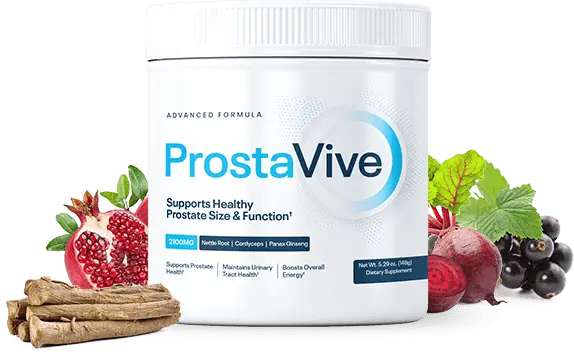If you’re searching for an honest ProstaVive review, you’ve come to the right place. Prostate health is a major concern for men over 40, and ProstaVive claims to support urinary function, reduce nighttime bathroom trips, and improve overall prostate health. But does it live up to the hype?
In this detailed ProstaVive review, we’ll analyze its ingredients, benefits, potential side effects, and customer feedback to help you decide if it’s worth buying.
What is ProstaVive?
ProstaVive is a natural dietary supplement designed to support prostate health in men. It contains a blend of herbs, vitamins, and minerals that target common prostate issues like:
✔ Frequent urination (especially at night)
✔ Weak urine flow
✔ Inflammation and swelling of the prostate
✔ Hormonal imbalances affecting prostate health
The formula is marketed as a safe, non-invasive alternative to prescription medications.
ProstaVive Ingredients: What’s Inside?
The effectiveness of any supplement depends on its ingredients. Here’s what’s in ProstaVive:
- Saw Palmetto Extract – A well-known herb for reducing prostate enlargement (BPH) and improving urinary flow.
- Beta-Sitosterol – A plant sterol that helps reduce inflammation and supports healthy urine flow.
- Pygeum Africanum Bark – Traditionally used to ease urinary discomfort linked to prostate issues.
- Stinging Nettle Root – Helps block hormones that cause prostate growth.
- Zinc & Selenium – Essential minerals for immune function and prostate health.
- Pumpkin Seed Extract – Rich in antioxidants that support urinary and prostate function.
These ingredients are backed by scientific studies, making ProstaVive a potentially effective supplement for prostate support.
Does ProstaVive Really Work?
Based on customer reviews and ingredient analysis, ProstaVive appears to help with:
✅ Reduced nighttime urination – Many users report fewer bathroom trips.
✅ Stronger urine flow – Less straining and dribbling.
✅ Improved prostate comfort – Reduced inflammation and swelling.
However, results vary—some men notice improvements within weeks, while others may take 2-3 months.
ProstaVive Side Effects: Is It Safe?
ProstaVive is made from natural ingredients and is generally well-tolerated. However, some users may experience mild side effects like:
- Upset stomach (if taken without food)
- Allergic reactions (rare, but possible with herbal extracts)
If you’re on medication or have a medical condition, consult your doctor before use.
ProstaVive Customer Reviews & Complaints
Positive Reviews:
⭐ “After 2 months, my frequent urination has decreased significantly. I sleep better now!” – Mark T.
⭐ “No more weak stream! My prostate feels healthier than it has in years.” – Robert K.
Negative Reviews:
⚠ “Didn’t see results until the third month. Patience is key.” – James L.
⚠ “Mild stomach discomfort at first, but it went away.” – David S.
Where to Buy ProstaVive & Price
ProstaVive is only available on the official website to avoid counterfeit products. Pricing options include:
- 1 Bottle: $69 + Shipping
- 3 Bottles: 177(177(59 per bottle) + Free US Shipping
- 6 Bottles: 294(294(49 per bottle) + Free US Shipping
Beware of Amazon & eBay sellers—these may be fake or expired products.
Final Verdict: Is ProstaVive Worth It?
Based on our research, ProstaVive is a legitimate prostate supplement with science-backed ingredients. While results vary, most users report improvements in urinary function and prostate comfort.
Pros:
✔ Natural, well-researched ingredients
✔ Reduces frequent urination
✔ Improves urine flow
✔ Positive customer reviews
Cons:
❌ Not an overnight solution (takes weeks to months)
❌ Only available online
Best For: Men over 40 experiencing prostate discomfort, frequent urination, or weak urine flow.
Rating: 4.5/5
👉 Click Here to Buy ProstaVive from the Official Website (Discount Available)
FAQ About ProstaVive
Q: How long does ProstaVive take to work?
A: Most users see results in 4-8 weeks, but full benefits may take 3 months.
Q: Is ProstaVive FDA-approved?
A: Dietary supplements aren’t FDA-approved, but ProstaVive is made in an FDA-registered facility.
Q: Can I take ProstaVive with other medications?
A: Consult your doctor if you’re on prescriptions (especially blood thinners or hormone therapy).
Q: Is there a money-back guarantee?
A: Yes, ProstaVive offers a 60-day refund policy if you’re unsatisfied.
Conclusion
If you’re struggling with prostate issues, ProstaVive could be a natural solution. With positive reviews and clinically supported ingredients, it’s worth trying—especially with the money-back guarantee.
